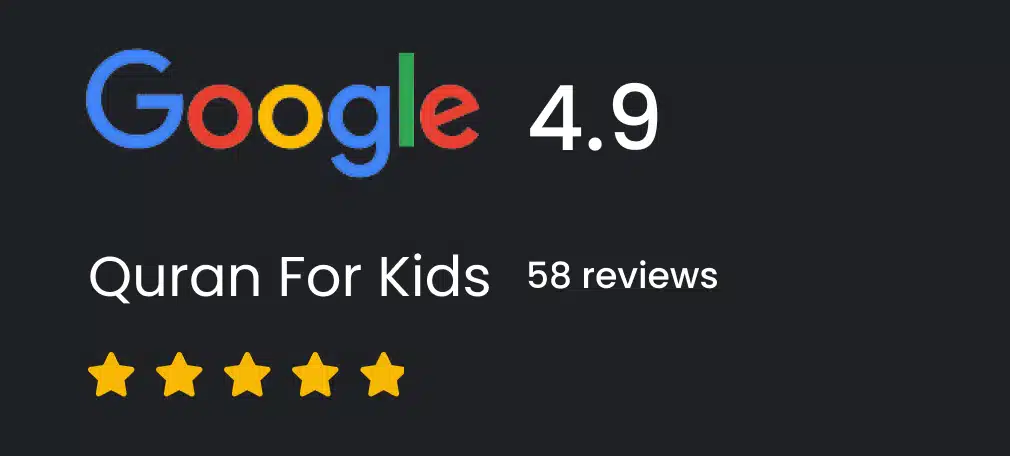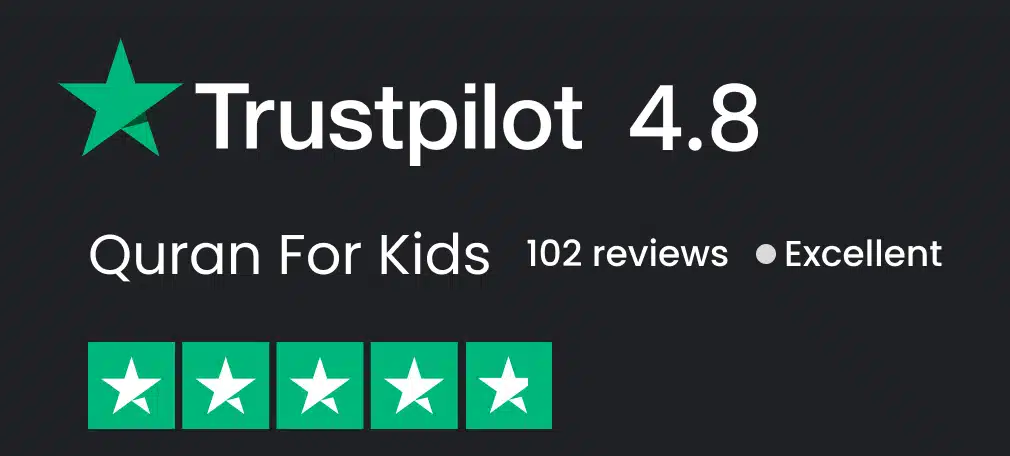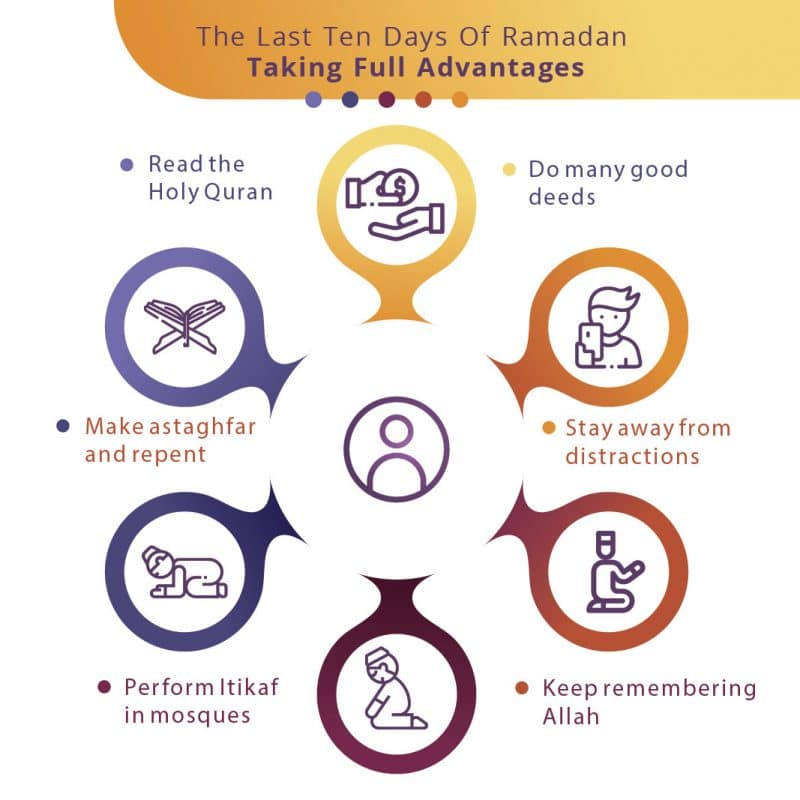The final ten days of Ramadan are deemed the most sacred and blessed. They must consequently be spent in acts of devotion and worship. Ayesha (R.A) reported that when these days would start, the Prophet (PBUH) would tighten his waist belt, meaning that he would do his best and utmost. He would pray all night long.
In their quest to attain the ‘Night of Power/Decree’, which is better than a thousand months, Muslims typically forsake their beds to worship Allah. The most sought after night of Qadr is found in the odd-numbered nights of the last ten. A widely celebrated night in which the Noble Quran was first revealed. In it, Jibrail (A.S) descends with Allah’s decrees. What follows is a strategic plan for Muslims to take the fullest advantage of these last ten days of Ramadan.
Pursue every good deed in the last ten days of Ramadan
In an elegant religion such as Islam, which appreciates and rewards even the smallest of acts such as smiling, there can be no dearth of good deeds. It is common knowledge that rewards are multiplied in Ramadan, and a Muslim should not lose out in accumulating good deeds.
Good deeds may involve but are not limited to:
- Being mindful of the haram and halal
- Serving parents with kindness
- Helping around the house or at work
- Removing an obstacle from the path
- Feeding the poor and needy
- Enjoining good and forbidding evil
A well-intended Muslim will never run short of ideas related to good works.
Avoid technological distractions
A Muslim should make noticeable changes in his daily routine during the last ten days. One of them should be to spend minimal time on social media unless it is to invite people to Islam or remind believers. Technology can be very addictive and can be both used and abused. Thus diversions like televisions, phones, and laptops should not be tolerated during these blessed days.
Keep the tongue moist with Allah’s Dhikr in the last ten days of Ramadan
One need not remain sitting on a prayer mat to indulge in Dhikr. Dhikr can be done while sitting, standing, walking, or lying down. Some of the most rewarding words whereby a Muslim remembers Allah are:
- Allāhu Akbar (God is the Greatest)
- SubḥānAllāh (Glory be to God)
- Alḥamdulillāh (All praise is due to God)
- Lā ilaha illAllāhu waḥdahoo lā sharikalahoo, lahul mulku wa lahul ḥamdu wa Huwa ‘alaa hulli shai’in qadeer (There is no god but Allah, alone, without partners. He is the Sovereign and His the praise, and He has power over everything)
- SubhānAllāhi wa biḥamdihi, SubhānAllāhi al-‘Aẓeem (Glory be to Allah and Praise Him, Glory be to Allah, the Supreme)
Doing Dhikr frequently protects the tongue from the evils of backbiting, slander, rumor-mongering, etc. It fills a Muslim’s heart with tranquility instead. Allah says in Surah Ar-Ra’d that the hearts are assured by remembering Allah.
Strive hard in Itikaf (seclusion dedicated to worship)
According to a report in Sahih Al-Bukhari, the Prophet (PBUH) would perform Itikaf in the final ten days of Ramadan until he passed away. A Muslim in Itikaf should keep himself preoccupied with acts of worship. He must not leave the neighborhood mosque except for emergencies. Itikaf provides an ideal atmosphere of seclusion for a worshipper to dedicate his time wholly to the seeking of Allah’s pleasure. Prophetic Sunnah indicates that acts of worship in Itikaf may include:
- Reciting and memorizing the Noble Quran
- Praying voluntary salah like Duha and Tahajjud
- Seeking and imparting beneficial knowledge
- Increasing one’s Dhikr (remembrance)
Both men and women may opt for Itikaf, during which sexual relations are prohibited, as stated in Surah Al-Baqarah.
Make excessive Astaghfar (repentance) in the last ten days of Ramadan
The seeking of forgiveness is due upon a Muslim daily. Our beloved Prophet (PBUH) was known to have repented to Allah at least a hundred times a day, to be written as one of His grateful slaves. Only the unfortunate ones who neglect Astaghfar are deprived of Allah’s forgiveness after the passing of Ramadan.
The following Astaghfar is highly recommended for the last ten days of Ramadan: Allahumma innaka ‘afuwwun tuhibb al-‘afwa fa’fu ‘anni. It means that Allah is the All-Forgiving and loves forgiveness, thus the reciter of the dua seeks His Forgiveness.
A sensible Muslim will not squander away the opportunity of being forgiven. Astaghfar is an act that is most beloved to the Almighty. In Sahih Al-Bukhari, the Prophet (PBUH) said that Allah is more pleased when His servant repents than someone who suddenly finds a camel he had lost in the desert.
Read more about the various forms of istaghfar here.
Read, understand and reflect upon the Noble Quran
It was in one of the odd-numbered nights from amongst the last ten that the Quran was first revealed. The Prophet (PBUH) would increase his recitation of the Quran during the last ten nights of Ramadan.
A Muslim must bear in mind that besides its recitation, reflecting upon the Quran and following its teachings are also of paramount importance. Hence, all three objectives must be evident in a believer’s approach to Allah’s Book.
A portion of the last ten days should be devoted to reading the Quran. Another should be used for understanding it, and a final predominant one to implementing its teachings.
Adult and young Muslims who can’t read the Quran yet can always opt for online Quran teachers at Online Quran Academy. An online Quran class may be their best option, especially during Ramadan, when traveling may not be convenient. Click here to know more about learning Quran online. All in all, the ultimate reward of having a strategic plan outlined for the last ten days





